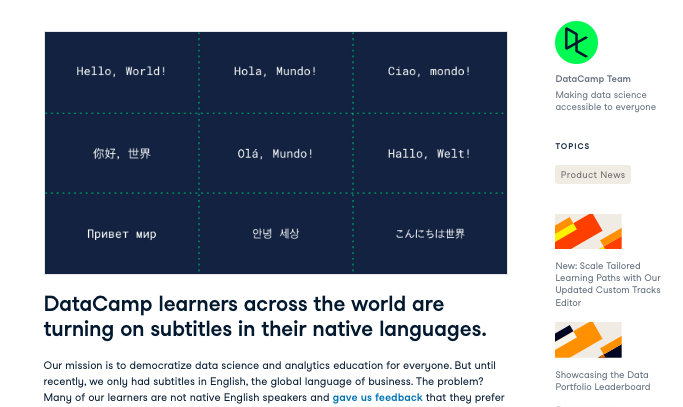When it comes to online learning platforms for data science and analysis, two prominent names come to mind: DataCamp and Udacity.
Get Started with DataCamp for FREE.The place to learn R, Python & Data Science. Check Special Pricing.
Both platforms offer a wide range of courses tailored to your learning needs. But which one is truly better? Is it DataCamp’s comprehensive catalog or Udacity’s industry-level content that reigns supreme?
Let’s dive in and find out!
Datacamp vs Udacity – Course Quality & Variety
When it comes to the quality and variety of courses, both DataCamp and Udacity have a lot to offer.
DataCamp boasts an extensive course catalog with over 390 courses. These courses cover a wide range of topics in data science and analysis, making it a go-to platform for individuals looking to upskill or start a career in the field.
The courses offered by DataCamp are designed to be engaging and practical, allowing learners to apply their knowledge in a hands-on manner.
In addition to individual courses, DataCamp also offers career and skill tracks. These tracks provide a structured learning path, guiding learners through a series of courses that build upon one another to develop a comprehensive understanding.
These career and skill tracks are ideal for individuals who want to dive deep into specific areas within data science.
Get Started with DataCamp for FREE.The place to learn R, Python & Data Science. Check Special Pricing.
On the other hand, Udacity specializes in industry-level data science content.
With over 200 courses, Udacity offers a curated selection of courses that are designed to equip learners with the skills necessary to thrive in the professional world.
These courses are developed in collaboration with industry experts and companies, ensuring that the content is relevant and up to date.
Udacity’s courses go beyond theoretical knowledge, focusing on practical applications and real-world projects. This approach prepares learners for the challenges they may face in their careers and helps them build a strong portfolio.
Below is a comparison table showcasing the course quantity and variety offered by each platform:
| DataCamp | Udacity |
|---|---|
| Over 390 courses | Over 200 courses |
| Offers career and skill tracks | Specializes in industry-level content |
| Covers a wide range of topics in data science and analysis | Focuses on practical applications and real-world projects |
As you can see, DataCamp’s course catalog provides a more extensive selection, giving learners greater flexibility and options to explore within the realm of data science.
Datacamp vs Udacity – Ease of Use
When it comes to user experience, both DataCamp and Udacity prioritize creating an intuitive learning environment. These platforms understand the importance of user-friendly interfaces and easy navigation, ensuring a seamless learning experience for their users.
DataCamp stands out with its gamified mechanics and visually engaging interface, making it particularly accessible to beginners.
Get Started with DataCamp for FREE.The place to learn R, Python & Data Science. Check Special Pricing.
The platform’s interactive approach encourages active learning and provides a sense of achievement as you progress through the courses.
On the other hand, Udacity offers an equally user-friendly platform, catering to both desktop and mobile users.
With a streamlined interface, Udacity ensures that you can conveniently access your courses and learning materials anytime, anywhere, making it a great choice for those always on the go.
Both DataCamp and Udacity recognize the increasing importance of mobile learning. As mobile devices become more prevalent in our daily lives, it’s crucial for e-learning platforms to provide a seamless mobile experience.
DataCamp’s mobile app allows you to access your courses, complete exercises, and track your progress on the go. The app is well-designed and optimized for mobile devices, ensuring an enjoyable learning experience even when you’re using a smaller screen.
Udacity also offers a mobile-friendly platform, allowing learners to access their content, watch videos, and engage with course materials easily.
Whether you’re commuting or have a few minutes to spare, Udacity ensures that you can continue your learning journey from your smartphone or tablet.
Datacamp vs Udacity – Foreign Language Support
DataCamp and Udacity understand the importance of catering to a diverse global audience.
Get Started with DataCamp for FREE.The place to learn R, Python & Data Science. Check Special Pricing.
While English serves as the primary language of instruction on both platforms, they offer foreign language support to enhance the learning experience for non-native English speakers.
DataCamp provides subtitles and translations in multiple languages, allowing learners to access course content in their native language.
This feature enables better comprehension and a more comfortable learning environment for individuals who may not be fluent in English.
Udacity also recognizes the significance of foreign language support and offers subtitles and translations in various languages for select courses.
This facilitates comprehension and ensures that students worldwide can access and benefit from their industry-level data science content.
Both platforms take strides to create an inclusive environment and enhance the learning experience for non-English speakers, allowing them to engage with the material effectively.
| Platform | Foreign Language Support |
|---|---|
| DataCamp | Subtitles and translations available in multiple languages |
| Udacity | Subtitles and translations available in various languages for select courses |
Datacamp vs Udacity – Certificates
Earning a certificate of completion in online learning is a significant achievement that can boost your professional profile.
Both DataCamp and Udacity offer certificates upon completion of their courses, providing evidence of your newly acquired skills.
DataCamp provides statements of accomplishment to students who successfully complete their courses. These certificates serve as tangible proof of your commitment to expanding your data science knowledge and can be a valuable addition to your resume or portfolio.
Udacity offers nanodegree certificates to students who complete their specialized programs. These certificates demonstrate your proficiency in specific areas of data science and can enhance your credibility among potential employers.
While both DataCamp and Udacity offer certificates, it’s important to note that these certificates are not accredited by universities.
However, they can still carry weight in the industry and showcase your dedication to continuous learning in data science.
It’s worth mentioning that Udacity certificates are recognized by some tech companies, which may provide additional value to your professional profile.
The recognition from these companies can help demonstrate your skills and facilitate career opportunities in the data science field.
Remember that while certificates hold value, they should not be the sole factor in choosing an online learning platform. Consider your specific learning goals, course offerings, and learning experience when making your decision.
| Certificates | Accreditation | Recognition |
|---|---|---|
| DataCamp | Not accredited by universities | No formal recognition |
| Udacity | Not accredited by universities | Recognized by some tech companies |
Datacamp vs Udacity – Pricing
When it comes to pricing, both DataCamp and Udacity offer options to suit individual learners.
Let’s take a closer look at their pricing models:
Besides the free plan, DataCamp provides three paid pricing plans: Premium, Teams, and Enterprise. Here is a breakdown of the pricing:
| Plan | Features | Price |
|---|---|---|
| Premium | Limited access to courses | $12 per month |
| Teams | Full access to all courses | $25 per month |
| Enterprise | Additional exclusive content and benefits | Custom pricing |
With DataCamp’s flexible pricing options, you can choose the plan that best fits your learning needs and budget.
Udacity offers a range of pricing structures, including monthly payments and fixed monthly payments for their nanodegree programs.
The cost of these programs can vary depending on the specialization and duration. Udacity frequently provides discounts and flexible payment options to make learning more accessible and affordable.
Now let’s take a look at an overview of the pricing structures offered by Udacity:
As you can see, Udacity’s pricing varies depending on the specific program you choose. It’s important to consider your budget and the value you expect to gain from the program before making a decision.
Overall, both DataCamp and Udacity offer pricing options that cater to different budgets and learning goals. It’s important to evaluate your needs and make an informed decision based on the available pricing plans.
Conclusion
When comparing DataCamp and Udacity in the realm of online learning and data science, it’s crucial to consider your specific learning goals and preferences.
Both platforms excel in providing high-quality courses in data science and analysis, but with some notable differences.
DataCamp boasts a diverse catalog of over 390 courses, offering a wide range of topics to choose from. Its gamified learning experience, accompanied by a user-friendly interface, makes it particularly accessible for beginners in the field.
DataCamp’s focus on building practical skills through interactive exercises and projects can greatly benefit those looking to gain hands-on experience.
On the other hand, Udacity stands out with its industry-level content and mentorship opportunities. With over 200 specialized courses, Udacity equips learners with the necessary skills to succeed in real-world data science situations.
The platform’s emphasis on project-based learning and connections with leading industry professionals can provide valuable networking opportunities and practical insights.
Ultimately, the choice between DataCamp and Udacity depends on your individual needs and learning style. If you prefer a wide-ranging catalog of courses and enjoy a gamified learning experience, DataCamp might be your best bet.
However, if you prioritize industry-level content and aim to establish connections in the field, Udacity may be the platform that aligns better with your goals.











